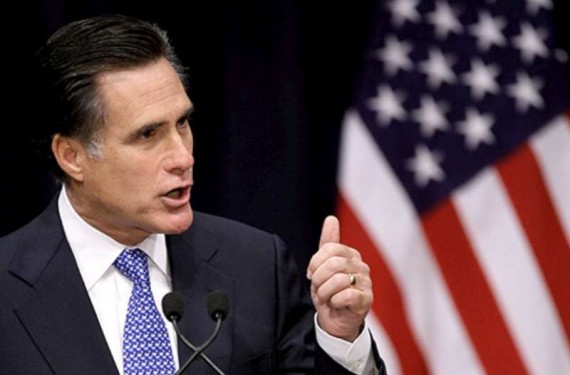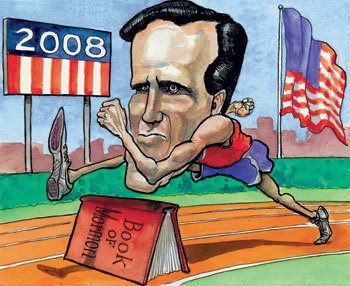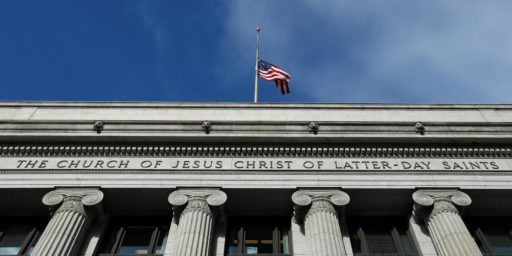Is Mitt Romney’s Religion Still An Issue? Or, Why We Need To Separate Religion And Politics
Some people still think Mitt Romney's religion is a relevant issue.
During the 2008 Presidential campaign, Mitt Romney’s religious faith became the issue of the day for several days as it became apparent that evangelical voters harbored doubts about him based in part, if not primarily, because of his Mormon faith. The controversy became serious enough to lead Romney to deliver a speech on religion and politics, akin at least in topic to John F. Kennedy’s address in 1960, at the George H.W. Bush Presidential Library in Houston. At that point, there seemed to be some consensus that he had push the issue behind him, but at least one evangelical writer believes its still an issue:
Romney’s Christian defenders often say that while the theology of Mormonism is very different from orthodox Christian theology, its social teachings on abortion, same-sex marriage, and a range of other issues are very similar. They sometimes cite Francis Schaeffer’s concept of “co-belligerents.” In pro-life battles and other battles, Schaeffer said, evangelicals should fight alongside Catholics, Mormons, and others who do not agree with us on theological particulars but do agree with us on social policy positions.
Weyrich ultimately repented of this view. Before Weyrich died in 2008, one of his last public appearances was to a small group of conservative leaders who were discussing whether to endorse John McCain for president after it became obvious that he would be the GOP nominee. Weyrich, though frail and bound to a wheelchair, said clearly and emphatically that he had made a grave mistake endorsing Romney, and essentially asked the social conservatives in the room to forgive him. For many of us, it was the last time we saw Weyrich alive.
What Weyrich understood was that you can’t have it “both ways” when it comes to Romney’s faith. You can’t say that his religious beliefs don’t matter, but his “values” do. The Christian worldview teaches that there is a short tether binding beliefs to the values and behaviors that flow from them. If the beliefs are false, then the behavior will eventually—but inevitably—be warped. Mormonism is particularly troubling on this point because Mormons believe in the idea of “continuing revelation.” They may believe one thing today, and something else tomorrow. This is why Mormons have changed their views, for example, on marriage and race. Polygamy was once a key distinctive of the religion. Now, of course, it is not. Mormons once forbade blacks from leadership roles. Now they do not. What else will change?
Even if a Mormon social teaching happens to concur with orthodox Christianity at this point in time, it is unreliable and subject to alteration. It’s tempting to say that “continuing revelation” has defined Romney’s career, who has changed his positions on same-sex marriage and abortion and just about every major “culture war” issue.
For evangelical Christians, Romney has some additional explaining to do. On such essential doctrines as the Trinity and the role of Jesus in salvation, there are major differences between orthodox (biblical) Christianity and Mormonism. But the real problem is that Mormons believe and teach an American history that is in many particulars completely unsubstantiated and in others demonstrably false. Mormons believe that the “lost tribes” of Israel actually ended up in America, and that Jesus visited America and these tribes during his incarnation. These are just a few of Mormonism’s highly idiosyncratic views of history.
Does Mitt Romney believe these views? Why or why not? Does he believe historical facts are matters of personal opinion? More to the point, does he really believe that, if he were to become the GOP nominee, he would not have to answer these questions before the world? Romney will face a Hobson’s choice. He will either affirm certain beliefs about reality and American history that most Americans will find false or flimsy, or else he will reject them be thereby “outed” as a hypocrite or traitor to his own belief system.
The vast majority of Americans won’t care about these theological implications. Indeed, Americans are generally tone-deaf to theological nuances. But to all American voters—religious or not—I would ask this question: Do we want a person who believes that history is something you can “make up as you go along” negotiating the outcomes of conflicts with real histories that go back thousands of years? Conflicts in the Middle East, in Asia, and elsewhere require an understanding of history and human nature that are not fabricated out of whole cloth.
The author goes on:
Certain qualifications make a candidate unfit to serve. I believe a candidate who either by intent or effect promotes a false and dangerous religion is unfit to serve. Mitt Romney has said it is not his intent to promote Mormonism. Yet there can be little doubt that the effect of his candidacy—whether or not this is his intent—will be to promote Mormonism. A Romney presidency would have the effect of actively promoting a false religion in the world. If you have any regard for the Gospel of Christ, you should care. A false religion should not prosper with the support of Christians. The salvation of souls is at stake.For me, that alone disqualifies him from my vote. Because Mormons believe in continuing revelation, it is possible that in the future the LDS church will renounce its heretical beliefs and come fully into the fold of orthodox Christianity. Many theologians and church historians believe the church is on such a trajectory. But if that happens, it is an event still well in the future. The Mormon Church of today is, by the lights of biblical evangelical Christianity, a false religion. If Mitt Romney believes what the Mormon Church teaches about the world and how it operates, then he is unfit to serve. We make him our President at great peril to the intellectual and spiritual health of our nation.
Now people are entitled to vote for or against someone for whatever reasons they choose, including their religion and even their race. That doesn’t mean, however, that their reasons are respectable or worthy of serious debate. I’m no expert in theology, so I can’t comment on the authors claims about Mormon theology. However, I do know religious intolerance when I see it and what he and others have said about Romney and Mormons is not much different from what was being said about Catholics when Al Smith ran for President in 1928 and even in 1960 when John F. Kennedy faced anti-Catholic bigotry in places like West Virginia. In both cases, I think that self-assuredness about one’s own religious beliefs combines with ignorance about other faiths (Catholicism up until Vatican II was in some was as mysterious to non-Catholics as Mormonism is to non-Mormons) and the result is a form of religious intolerance that really has no place in politics.
I’m no Romney fan, but that’s because of his record as Governor, his flip-flopping, and, quite honestly, something he said in the very religion speech that was supposed to have put this issue to bed for him:
“There are some who may feel that religion is not a matter to be seriously considered in the context of the weighty threats that face us. If so, they are at odds with the nation’s founders, for they, when our nation faced its greatest peril, sought the blessings of the Creator. And further, they discovered the essential connection between the survival of a free land and the protection of religious freedom. In John Adams’ words: ‘We have no government armed with power capable of contending with human passions unbridled by morality and religion… Our constitution was made for a moral and religious people.’
“Freedom requires religion just as religion requires freedom. Freedom opens the windows of the soul so that man can discover his most profound beliefs and commune with God. Freedom and religion endure together, or perish alone.”
You’re wrong there Governor. Freedom, in the sense of individual liberty, does not require religion and more than it requires one to believe in the existence of extraterrestrials. Individuals possess rights because of their nature as individuals, not because of doctrines established 1,000 years ago at a religious conference. And, more importantly, one can believe in individual liberty without believing in any god.
Before he continues down the path that he laid out in his speech, perhaps Romney should consider the words of America’s 3rd President:
Believing with you that religion is a matter which lies solely between man and his God, that he owes account to none other for his faith or his worship, that the legislative powers of government reach actions only, and not opinions, I contemplate with sovereign reverence that act of the whole American people which declared that their legislature should ‘make no law respecting an establishment of religion, or prohibiting the free exercise thereof,’ thus building a wall of separation between church and State.
It’s time to extend that wall and separate religion and politics.







History is a fable, agree upon.
“More to the point, does he really believe that, if he were to become the GOP nominee, he would not have to answer these questions before the world? ”
I suspect that if he becomes the Republican nominee, he would no longer have to answer religious doctrinal questions like the ones set forth. The vast majority of those who view answers to questions like those as important in their voting decision will have already had a chance to vote for or against him before he became the Republican nominee.
What I find interesting, and a bit sickening, is that Romney, like Kennedy before him, is pledging not to be beholden to his religion when making decisions for the country. Meanwhile, you’ve got other candidates (Bachmann comes to mind, but there are many others both national and local) who are loudly proclaiming the exact opposite – that they will not only bring their religion to the table in executing their office, but fully intend to force their personal interpretation of in into law. These are people who should be branded ‘enemies of the Constitution’, as the Tea-types like to say, but instead they’re Big Names. It gives me The Fear…
“Is Mitt Romney’s religion still an issue”?
Very nicely done, Doug.
Well, not as long as he’s not at “religious services” twiddling his thumbs while the preacher declares his message, to one and all, that “G-d Damn America” and just smiles. Nope. not a problem.
I know,I know, he was playing golf that morning and never heard it.
I’d say that’s up to his primary opponents.
I bet it will become one if he and Palin are still neck and neck rounding the turn for home…
You can (and should) separate religion from government. Separating it from politics, however, is impossible.
Again, Kevin Phillips, American Theocracy. Still more true than we want to believe.
Believeing in a god, several gods, black cats, broken mirrors, or walking under ladders – Who cares what his superstitions are?
Tax cuts don’t pay for themselves, evolution is not a hoax, 100% of the peer reviewed science on the human impact on climate change is not faked – accepting the facts on those things is far more important.
Mormon is that extra bit of crazy.
It all started with the Jews who were of course crazy: storm God who went around murdering people at random, couldn’t find their way out of Gaza for 40 years, angels sent around to kill children in their sleep, the extermination of cities full of people and so on.
The Christians take the ball and run with it, adding a whole new layer of crazy: God makes his son into a whipping boy, virgin birth, crucifixion and resurrection, cannibalistic blood-drinking rituals, etc….
Christians liked to think, “Well, that’s all the crazy anyone is going to need, right?”
Turns out, no. More crazy was needed: golden tablets from an angel with the unfortunate name of Moroni, Jesus flying Delta from Israel to Utah, prophets and polgamy and magic underwear and God in orbit around planet Kolob. Oh my!
I like to think that Mormonism is the stepping stone between the crazy of Christianity and the inspired balls-out, idjit freak show that is Scientology. I can see the two getting together.
I have no problem with his religion. Unfortunately I know there are many who do. I know people who don’t like Huckabee for his religion or Dole because he shook with his left hand. I may disagree with reasons why some people vote for or against someone but the fact remains they do. Mitt religion will hurt him in the primary and general election more than most of the candidates’ religion will.
@michael wrote:
… ok I’ll bite: so why in that case are they Mormons and not Morons (or at latest Morans)?
Sorry… couldn’t resists… plus I missed out on the Weiner Roast.
Spot on, Doug.
mattb:
I have to assume someone in the early Mormon equivalent of the public relations department said a19th century version of, “Moroni? Are you fornicating with me? Okay, bretheren: we are in damage control mode.”
@Michael R.
I love it. You win this thread!
Truly that realization led to the soiling of some temple garments… Perhaps the response was: “Keep digging! There’s got to be something buried by God or Morani around here that provides the answer!”
(rereading that I’m reminded why I stay away from the comedy).
From Amy Sullivan’s “Does Mitt Romney Have a Prayer with Evangelicals?”: in 2008 44% of GOP primary voters were evangelicals, but when Romney bowed out of the race he had only been able to get 20% of those votes.
Sullivan also wrote about the same issue in 2005.
—
A question , has there ever been a candidate who decided not to contest in one or more of the earliest primaries and ended up winning the nomination?
The only other candidate I can think of that decided not contest in the earliest primaries was Giuliani, and we all know how that ended.
Since the Republicans have not chance of winning, the religion, past experiences, positions, charisma, or speaking ability of the Republicans is irrelevant.
The only thing that is relevant in politics today is what the Democrats can accomplish and what the Democrats are planning to do.
After six months of the incompetent leadership of Boehner coming after 8 years of the incompetent Bush Administration, everyone should just admit that the Republicans are irrelevant to policy, governance, or politics in the U.S.
You can believe in what ever you want, It don’t make it a reality.
A tip for you then, Atheism is the religion of Marxism. Evolution is its creation story.
These crazy ideas you hold and have the ability to share are influenced by this religion but it is not this religion that gave you the liberty to hold them or share them.
And for the rest of you who Mock God, good luck with that.
Oh, the question: I don’t personally want a planet worshiper or a believer in a false Christianity in the white house. You know, like the guy who is there now.
But I would probably vote like I always do, for the best non Abortionist left.
Romney needs to address this issue if he is to taken seriously as a candidate. Does he hold the foundation story of Mormanism to be true in all its particulars? Or can he assure us that like other religions foundation stories it is mostly myth based upon some historical facts concerning real people and events.
The important question is can he tell the difference between myth and reality and can he make the distinction clear to folks.
Jut like it would be dangerous to have a creationist in the White House it would be equally dangerous to have a fundamentalist Morman in the White House. The occupant of that office must be clear headed enough to distinguish fact from fiction, no matter where the prejudice of his religious background may lead.
As one of the hardercore hardcore libertarians around here, I don’t agree with Michael Reynolds on a lot of things, but I thought the description of religion was spot-on.